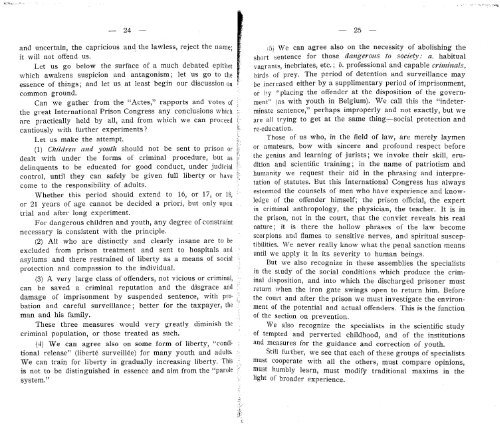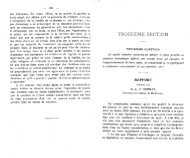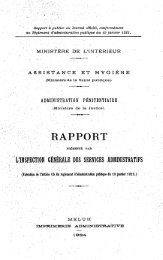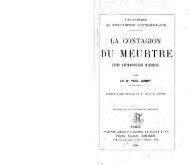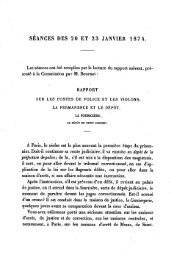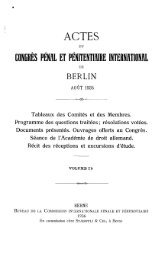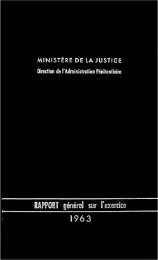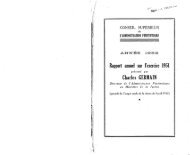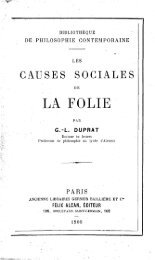— 24 —and uncertain, the capricious and the lawless, reject the name;it will not offend us.Let us go below the surface of a much debated epithetwhich awakens suspicion and antagonism; let us go to theessence of things ; and let us at least begin our discussion oncommon ground.Can we gather from the "Actes," rapports and votes ofthe great International Prison Congress any conclusions whichare practically held by ail, and from which we can pi'oceedcautiously with further experiments?Let us make the attempt.(1) Children and youth should not be sent to prison ordealt with under the forms of criminal procédure, but asdelinquents to be educated for good conduct, under judicialcontrol, until they can safely be given full liberty or havecorne to the responsibility of adults.Whether this period should extend to 16, or 17, or 18,or 21 years of âge cannot be decided a priori, but only upontrial and after long experiment.For dangerous children and youth, any degree of constraintnecessary is consistent with the principle.(2) Ail who are distinctly and clearly insane are to beexcluded from prison treatment and sent to hospitals andasylums and there restrained of liberty as a means of socialprotection and compassion to the individual.(3) A very large class of offenders, not vicious or criminal,can be saved a criminal réputation and the disgrâce anddamage of imprisonment by suspended sentence, with probationand careful surveillance ; better for the taxpayer, theman and his family.Thèse three measures Avould very greatly diminish thecriminal population, or those treated as such.(4) We can agrée also on some form of liberty, "conditionalrelease" (liberté surveillée) for many youth and adults.We can train for liberty in gradually increasing liberty. Thisis not to be distinguished in essence and aim from the "parolesystem."— 25 —(5) We can agrée also on the necessity of abolishing theshort sentence for those dangerous to society : a. habituaivagrants, inebriates, etc. ; b. professional and capable criminals,birds of prey. The period of détention and surveillance maybe increased either by a supplimentary period of imprisonment,or by "placing the offender at the disposition of the government"(as with youth in Belgium). We call this the "indeterminatesentence," perhaps improperly and not exactly, but weare ail trying to get at the same thing—social protection andre-education.Those of us who, in the field of law, are merely laymenor amateurs, bow with sincère and profound respect beforethe genius and learning of jurists; we invoke their skill, éruditionand scientific training; in the name of patriotism andhumanity we request their aid in the phrasing and interprétationof statutes. But this International Congress has alwaysesteemed the counsels of men who have expérience and knowledgeof the offender himself; the prison officiai, the expertin criminal anthropology, the physician, the teacher. It is inthe prison, not in the court, that the convict reveals his realnature; it is there the hollow phrases of the law becomescorpions and fiâmes to sensitive nerves, and spiritual susceptibilities.We never really know what the pénal sanction meansuntil we apply it in its severity to human beings.But we also recognize in thèse assemblies the specialistsin the study of the social conditions which produce the criminaldisposition, and into which the discharged prisoner mustreturn when the iron gâte swings open to return him. Beforethe court and after the prison we must investigate the environmentof the potential and actual offenders. This is the functionof the section on prévention.We also recognize the specialists in the scientific studyof tempted and perverted childhood, and of the institutionsand measures for the guidance and correction of youth.Still further, we see that each of thèse groups of specialistsmust cooperate with ail the others, must compare opinions,must humbly learn, must modify traditional maxims in thelight of broader expérience.
— 26 —The ultimate and final test of a pénal law, of any law,is not its constitutionality, its agreement with traditions ofjudicial décisions, its conformity with ancient usages. "Newoccasions teach new duties, time makes ancient good uncouth,"Inspired by thèse convictions, convoked by ail the greatnations for thèse noble ends, we enter the discussions of thismémorable week. Courageous to défend our own conclusions,eager to learn new truths, courteous in présence of opposition,we are at the gâte of our high duty. Forward! The EighthInternational Prison Congress is open. (Prolonged applause.)(TRADUCTION)M. le prof. Ch. Richmond Henderson, acclamé par l'assemblée,prend place à la présidence et prononce l'allocution suivante:Mesdames, Messieurs !Permettez-moi d'abord de déposer quelques fleurs sur latombe de mon honoré et regretté prédécesseur, le D r Barrows.A Budapest, nous avions salué son nom de nos acclamations,et nous l'avions choisi pour les fonctions qu'il a honorées deses talents et qu'il a consacrées par son dévouement.Pour vos gracieux suffrages et le témoignage de votreconfiance et de votre sympathie depuis que son manteau m'esttombé sur les épaules, veuillez agréer l'expression de masincère reconnaissance.Dans cette capitale de notre nation américaine, qui portele nom de notre premier président, Washington, nous voussouhaitons mille fois et chaleureusement la bienvenue. Danscette ville, à l'heure bienheureuse de la liberté et du triomphede l'union, notre simple, honnête et grand Lincoln, le présidentmartyr, inclina la tête et des millions d'affranchis fondirenten larmes. Dans cette ville, illustrée par le souvenir de cesdeux grands cœurs, nous saluons les messagers de la justiceet de la pitié intelligente de l'Orient et de l'Occident, et notrePorte d'Or s'ouvre pour les navires qui vous amènent, Messieurs,des foyers de la civilisation la plus ancienne. Vous, représentantsde l'Asie et de ses puissantes nations, pleines de l'espéranced'une renaissance, soyez les bienvenus. Vous que l'Afrique
- Page 1 and 2: DEA LA DEMANDE DE LA COMMISSION PÉ
- Page 3 and 4: IVMalheureusement cette fois-ci ce
- Page 5 and 6: VIIIIXII 0 section. Questions péni
- Page 7 and 8: CONGRÈS PÉNITENTIAIRE INTERNATION
- Page 9 and 10: XVIAutres délégués officiels:MM.
- Page 11 and 12: XXEspagne.MM. *Cadalso, Fernando, D
- Page 13 and 14: XXIVMM. Tyrrolls, Frank P., Capt. W
- Page 15 and 16: XXVIIIMr. Ne al, L. B., M. D., Phys
- Page 17 and 18: XXXIIMM. Melville, Henry, Présiden
- Page 19 and 20: XXXVIMr. Johnson, E. M., Petersburg
- Page 21 and 22: XLXLIMM.*le D r R. Vambery, procure
- Page 23 and 24: PROGRAMME DES QUESTIONS.LQuestions
- Page 25 and 26: ■',XLVIIItransition entre la pén
- Page 27 and 28: 1,11DEUXIÈME QUESTION.Quelles amé
- Page 29 and 30: LVIles pays où les ivrognes crimin
- Page 31 and 32: LX1. La peine de mort existe-t-elle
- Page 34 and 35: SÉANCE SOLENNELLE D'OUVERTUREDIMAN
- Page 36 and 37: — 6 —tion of the Suprême Being
- Page 38 and 39: — 10 —Ail human expérience sho
- Page 40 and 41: — 14 —milieu et, cette vérité
- Page 42 and 43: — 18 —— 19 —Mr. Président,
- Page 44 and 45: — 21 —Professor Henderson, gree
- Page 48 and 49: — 27 —nous envoie, vous, l'avan
- Page 50: — 30 — — 31 -Mais, chers et h
- Page 53 and 54: — 34 —— 35 —Il propose enfi
- Page 55 and 56: — 38 —d'oindre les pieds du Chr
- Page 57 and 58: — 43very often forgées that; and
- Page 59 and 60: — 46 —of need and the présence
- Page 61 and 62: PREMIÈRE SECTIONLÉGISLATION PÉNA
- Page 63 and 64: — 54 —a) Pour quelle catégorie
- Page 65 and 66: 'I— 58 —Un tel système de dét
- Page 67 and 68: — 62 —M. Engelen (Hollande). La
- Page 69 and 70: — 66 -être d'exercer une influen
- Page 71 and 72: — 71 —préventive et pleine de
- Page 73 and 74: — 74 —but pratique de l'institu
- Page 75 and 76: — 79 —Séance du 4 octobre 1910
- Page 77 and 78: — 82 — 83 —qui suppose involo
- Page 79 and 80: — 86 —degré du besoin et la pr
- Page 81 and 82: - 91 —L'on ne maintiendra des rè
- Page 83 and 84: — 94pénalité qu'une place plus
- Page 85 and 86: - 98 —M. le prof. Vambéry. M. le
- Page 87 and 88: — 102 —échéant, comme motivan
- Page 89 and 90: — 106 —paternelle. Pour la pein
- Page 91 and 92: - 110 —tion de malfaiteurs, pour
- Page 93 and 94: DEUXIÈME SECTION.Questions pénite
- Page 95 and 96: — 118 —En Russie, les grandes p
- Page 97 and 98:
— 122 —5° Le travail qui convi
- Page 99 and 100:
— 126 —Cette observation est ap
- Page 101 and 102:
- 130 —qu'il a fait et comment il
- Page 103 and 104:
— 134 —tème de la libération
- Page 105 and 106:
— 138 —Des chefs de police sont
- Page 107 and 108:
142 —se faire par voie de grâce.
- Page 109 and 110:
— 146 —M. Vidal (France). En Fr
- Page 111 and 112:
150 —qui auront été condamnés
- Page 113 and 114:
— 154 —par la Commission pénit
- Page 115 and 116:
TROISIÈME SECTIONMOYENS PRÉVENTIF
- Page 117 and 118:
Sikabony et le sien l ).— 162 —
- Page 119 and 120:
— 166 —mière résolution, le m
- Page 121 and 122:
— 170 —M. Thomas Holmes tient
- Page 123 and 124:
— 174 —et sévère. Il y a main
- Page 125 and 126:
— 178 —la nécessité d'établi
- Page 127 and 128:
- 182 —M. Edwin Mulready. Nous ne
- Page 129 and 130:
- 186 —nécessaire dans l'intér
- Page 131 and 132:
- 190 —séparément. Dès que cet
- Page 133 and 134:
— 194 —3° les vagabonds profes
- Page 135 and 136:
— 198 —libération. La l re cla
- Page 137 and 138:
— 202 —4. Monopole des métiers
- Page 139 and 140:
— 206 —M. le D 1 ' Cooke décla
- Page 141 and 142:
— 210 —dans la plupart des Etat
- Page 143 and 144:
— 214 —sans l'organisation d'un
- Page 145 and 146:
— 218IL Il est difficile, sinon i
- Page 147 and 148:
- 222 -Miss Rosa-M. Barrett, à Kin
- Page 149 and 150:
— 227 —«3. La défense (par d
- Page 151 and 152:
— 230 —préventive. Le mineur n
- Page 153 and 154:
— 234 —il en existe au tribunal
- Page 155 and 156:
— 238 —2. Il y aurait lieu de s
- Page 157 and 158:
— 242 —que désirent souvent r
- Page 159 and 160:
5— 246 —Séance du 4 octobre 19
- Page 161 and 162:
— 250 —M. William Healey, direc
- Page 163 and 164:
- 254 —Les enfants faibles d'espr
- Page 165 and 166:
— 258 —peut être qu'affirmativ
- Page 167 and 168:
— 262 —«Après examen de la qu
- Page 169 and 170:
- 266 -«5. Dans tous les cas où i
- Page 171 and 172:
— 270 —M me Marie Hofstcde, à
- Page 173 and 174:
— 274 —enfants sont trop enclin
- Page 175 and 176:
— 278 —se conforment à la loi
- Page 177 and 178:
- 282 —classes de travaux manuels
- Page 179 and 180:
— 286 —M. Néander estime que l
- Page 181 and 182:
— 290 —au bénéfice d'une pens
- Page 183 and 184:
— 294 —dans le monde et elle lu
- Page 185 and 186:
— 298 — — 299 —sur leur sor


